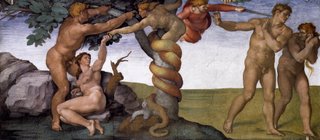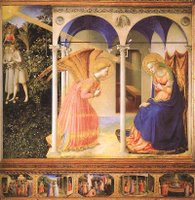Feast of the Immaculate Conception, December 8, 2005
 What picture does [the Genesis passage regarding the Fall] show us? The human being does not trust God. Tempted by the serpent, he harbors the suspicion that in the end, God takes something away from his life, that God is a rival who curtails our freedom and that we will be fully human only when we have cast Him aside; in brief, that only in this way can we fully achieve our freedom. The human being lives in the suspicion that God's love creates a dependence and that he must rid himself of this dependency if he is to be fully himself.
What picture does [the Genesis passage regarding the Fall] show us? The human being does not trust God. Tempted by the serpent, he harbors the suspicion that in the end, God takes something away from his life, that God is a rival who curtails our freedom and that we will be fully human only when we have cast Him aside; in brief, that only in this way can we fully achieve our freedom. The human being lives in the suspicion that God's love creates a dependence and that he must rid himself of this dependency if he is to be fully himself.Man does not want to receive his existence and the fullness of his life from God. He himself wants to obtain from the tree of knowledge the power to shape the world, to make himself a god, raising himself to God's level, and to overcome death and darkness with his own efforts. He does not want to rely on love that to him seems untrustworthy; he relies solely on his own knowledge since it confers power upon him. Rather than on love, he sets his sights on power, with which he desires to take his own life autonomously in hand. And in doing so, he trusts in deceit rather than in truth and thereby sinks with his life into emptiness, into death.
Love is not dependence but a gift that makes us live. The freedom of a human being is the freedom of a limited being, and therefore is itself limited. We can possess it only as a shared freedom, in the communion of freedom: only if we live in the right way, with one another and for one another, can freedom develop. We live in the right way if we live in accordance with the truth of our being, and that is, in accordance with God's will. For God's will is not a law for the human being imposed from the outside and that constrains him, but the intrinsic measure of his nature, a measure that is engraved within him and makes him the image of God, hence, a free creature.
If we live in opposition to love and against the truth - in opposition to God - then we destroy one another and destroy the world. Then we do not find life but act in the interests of death. All this is recounted with immortal images in the history of the original fall of man and the expulsion of man from the earthly Paradise.
Dear brothers and sisters, if we sincerely reflect about ourselves and our history, we have to say that with this narrative is described not only the history of the beginning but the history of all times, and that we all carry within us a drop of the poison of that way of thinking, illustrated by the images in the Book of Genesis. We call this drop of poison "original sin."
Precisely on the Feast of the Immaculate Conception, we have a lurking suspicion that a person who does not sin must really be basically boring and that something is missing from his life: the dramatic dimension of being autonomous; that the freedom to say no, to descend into the shadows of sin and to want to do things on one's own is part of being truly human; that only then can we make the most of all the vastness and depth of our being men and women, of being truly ourselves; that we should put this freedom to the test, even in opposition to God, in order to become, in reality, fully ourselves. In a word, we think that evil is basically good, we think that we need it, at least a little, in order to experience the fullness of being. * * * We think that a little bargaining with evil, keeping for oneself a little freedom against God, is basically a good thing, perhaps even necessary.
If we look, however, at the world that surrounds us we can see that this is not so; in other words, that evil is always poisonous, does not uplift human beings but degrades and humiliates them. It does not make them any the greater, purer or wealthier, but harms and belittles them.
 This is something we should indeed learn on the day of the Immaculate Conception: the person who abandons himself totally in God's hands does not become God's puppet, a boring "yes man"; he does not lose his freedom. Only the person who entrusts himself totally to God finds true freedom, the great, creative immensity of the freedom of good. The person who turns to God does not become smaller but greater, for through God and with God he becomes great, he becomes divine, he becomes truly himself. The person who puts himself in God's hands does not distance himself from others, withdrawing into his private salvation; on the contrary, it is only then that his heart truly awakens and he becomes a sensitive, hence, benevolent and open person.
This is something we should indeed learn on the day of the Immaculate Conception: the person who abandons himself totally in God's hands does not become God's puppet, a boring "yes man"; he does not lose his freedom. Only the person who entrusts himself totally to God finds true freedom, the great, creative immensity of the freedom of good. The person who turns to God does not become smaller but greater, for through God and with God he becomes great, he becomes divine, he becomes truly himself. The person who puts himself in God's hands does not distance himself from others, withdrawing into his private salvation; on the contrary, it is only then that his heart truly awakens and he becomes a sensitive, hence, benevolent and open person.The closer a person is to God, the closer he is to people. We see this in Mary. The fact that she is totally with God is the reason why she is so close to human beings. For this reason, she can be the Mother of every consolation and every help, a Mother whom anyone can dare to address in any kind of need in weakness and in sin, for she has understanding for everything and is for everyone the open power of creative goodness. In her, God has impressed his own image, the image of the One who follows the lost sheep even up into the mountains and among the briars and thorn-bushes of the sins of this world, letting himself be spiked by the crown of thorns of these sins in order to take the sheep on his shoulders and bring it home. As a merciful Mother, Mary is the anticipated figure and everlasting portrait of the Son.
Thus, we see that the image of the Sorrowful Virgin, of the Mother who shares her suffering and her love, is also a true image of the Immaculate Conception. Her heart was enlarged by being and feeling together with God. In her, God's goodness came very close to us.
Mary thus stands before us as a sign of comfort, encouragement and hope. She turns to us, saying: "Have the courage to dare with God! Try it! Do not be afraid of him! Have the courage to risk with faith! Have the courage to risk with goodness! Have the courage to risk with a pure heart! Commit yourselves to God, then you will see that it is precisely by doing so that your life will become broad and light, not boring but filled with infinite surprises, for God's infinite goodness is never depleted!"
On this Feast Day, let us thank the Lord for the great sign of his goodness which he has given us in Mary, his Mother and the Mother of the Church. Let us pray to him to put Mary on our path like a light that also helps us to become a light and to carry this light into the nights of history. Amen.
No comments:
Post a Comment